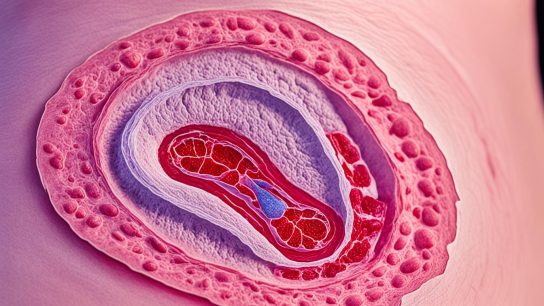Thyroid problems can have a significant impact on a woman’s overall health and well-being. It is essential to recognize the signs and symptoms of thyroid disorders to seek appropriate medical attention. In this article, we will explore the common symptoms of thyroid problems in females, including hypothyroidism and hyperthyroidism. We will also discuss the causes, risk factors, and potential complications associated with these conditions.
If you suspect that you or a loved one may be experiencing thyroid issues, it’s important to familiarize yourself with the symptoms to aid in early detection and proper management. Let’s dive deeper into the world of thyroid disorders and understand how they can manifest in females.
What Are the Symptoms of Thyroid Problems in Females?
Hypothyroidism, also known as an underactive thyroid, occurs when the thyroid gland doesn’t produce enough thyroid hormones. This condition can lead to a range of symptoms that are more commonly seen in females. Understanding the common hypothyroidism symptoms in females can help with early detection and appropriate treatment.
Some common symptoms of hypothyroidism in females include:
- Fatigue: Feeling extremely tired even after a good night’s sleep.
- Sensitivity to Cold: Feeling unusually cold, even in mild temperatures.
- Constipation: Having difficulty with bowel movements and experiencing infrequent or hard stools.
- Dry Skin: Skin that feels dry, rough, and may be itchy.
- Weight Gain: Unexpected weight gain or difficulty losing weight despite efforts.
- Puffy Face: Facial swelling, especially around the eyes.
- Hoarse Voice: A husky or hoarse voice that doesn’t improve with time.
- Muscle Weakness: Feeling weak and experiencing muscle aches or cramps.
- Menstrual Irregularities: Changes in the menstrual cycle, such as heavier or irregular periods.
- Depression: Feeling sad, hopeless, and experiencing a loss of interest in activities.
Additionally, hypothyroidism in females may also manifest with other symptoms, including:
- Memory Problems: Difficulty concentrating, forgetfulness, and mental fog.
- Slowed Heart Rate: A heart rate that is slower than usual.
If you are experiencing any of these hypothyroidism symptoms in females, it is important to consult with a healthcare professional for an accurate diagnosis and appropriate treatment. Keep in mind that these symptoms can develop slowly and may be mistaken for signs of aging or other health issues.

When left untreated, hypothyroidism can have significant impacts on a woman’s overall well-being and quality of life. Therefore, early detection and management of hypothyroidism are key to living a healthy and fulfilling life.
| Symptom | Description |
|---|---|
| Fatigue | Feeling extremely tired even after a good night’s sleep. |
| Sensitivity to Cold | Feeling unusually cold, even in mild temperatures. |
| Constipation | Having difficulty with bowel movements and experiencing infrequent or hard stools. |
| Dry Skin | Skin that feels dry, rough, and may be itchy. |
| Weight Gain | Unexpected weight gain or difficulty losing weight despite efforts. |
| Puffy Face | Facial swelling, especially around the eyes. |
| Hoarse Voice | A husky or hoarse voice that doesn’t improve with time. |
| Muscle Weakness | Feeling weak and experiencing muscle aches or cramps. |
| Menstrual Irregularities | Changes in the menstrual cycle, such as heavier or irregular periods. |
| Depression | Feeling sad, hopeless, and experiencing a loss of interest in activities. |
| Memory Problems | Difficulty concentrating, forgetfulness, and mental fog. |
| Slowed Heart Rate | A heart rate that is slower than usual. |
Hypothyroidism is a manageable condition, and with the right treatment, individuals can lead healthy and fulfilling lives.
Symptoms of Hyperthyroidism in Females
Hyperthyroidism is a condition characterized by an overactive thyroid gland, resulting in the excessive production of thyroid hormones. This hormonal imbalance can lead to a range of symptoms, which can vary in severity and impact a person’s overall well-being. In females, hyperthyroidism can present with the following signs and symptoms:
- Unintentional weight loss: Hyperthyroidism can cause a noticeable decrease in body weight, even without changes in diet or exercise habits.
- Rapid or irregular heartbeat: A racing or irregular heartbeat is a common symptom of hyperthyroidism in females due to the increased metabolic rate.
- Increased anxiety: Hyperthyroidism can lead to heightened feelings of anxiety and restlessness.
- Heat intolerance: Women with hyperthyroidism may have difficulty tolerating high temperatures and may experience excessive sweating.
- Excessive sweating: Excessive sweating, even in normal conditions, is a common symptom of hyperthyroidism in females.
- Irritability: Increased irritability and mood changes are often observed in individuals with hyperthyroidism.
- Tremors: Hyperthyroidism can cause noticeable trembling or shaking of the hands and fingers.
- Thinning hair: Hair loss and thinning hair are common symptoms of hyperthyroidism in females.
- Protruding eyes: A condition known as Graves’ ophthalmopathy, which causes the eyes to appear bulging or protruding, is frequently associated with hyperthyroidism.
These symptoms can significantly impact a person’s quality of life and should not be ignored. If you are experiencing any of these signs or symptoms, it is essential to consult with a healthcare professional for a proper diagnosis and appropriate treatment.

Comparing Hyperthyroidism Symptoms in Females
| Symptoms | Description |
|---|---|
| Unintentional weight loss | An noticeable decrease in body weight, even without changes in diet or exercise habits. |
| Rapid or irregular heartbeat | A racing or irregular heartbeat due to the increased metabolic rate. |
| Increased anxiety | Heightened feelings of anxiety and restlessness. |
| Heat intolerance | Difficulty tolerating high temperatures and excessive sweating. |
| Excessive sweating | Increased sweating, even in normal conditions. |
| Irritability | Heightened irritability and mood changes. |
| Tremors | Noticeable trembling or shaking of the hands and fingers. |
| Thinning hair | Hair loss and thinning hair. |
| Protruding eyes | Bulging or protruding eyes (Graves’ ophthalmopathy). |
Thyroid Symptoms in Infants, Children, and Teens
Hypothyroidism can also affect infants, children, and teens. Early diagnosis and treatment are crucial to prevent severe physical and mental development problems.
Symptoms in Infants
In infants, the following symptoms may indicate hypothyroidism:
- Feeding problems
- Poor growth
- Constipation
- Jaundice
- Poor muscle tone
- Hoarse crying
- Enlarged tongue
The appearance of these symptoms in infants should be monitored closely as prompt intervention is essential for healthy growth and development.
Symptoms in Children and Teens
Hypothyroidism can also impact children and teenagers, leading to the following symptoms:
- Poor growth
- Delayed development of permanent teeth
- Delayed puberty
- Poor mental development
Recognizing these symptoms in children and teens is crucial for timely intervention to support their physical and cognitive development.
Here’s an informative table summarizing the symptoms of hypothyroidism in infants, children, and teens:
| Age Group | Symptoms |
|---|---|
| Infants |
|
| Children and Teens |
|
Early diagnosis and appropriate treatment can help infants, children, and teens with hypothyroidism lead healthy and fulfilling lives.

Causes of Thyroid Problems in Females
The most common cause of thyroid issues in females is an autoimmune disease called Hashimoto’s disease. This condition occurs when the immune system mistakenly attacks the thyroid gland, leading to inflammation and decreased thyroid hormone production. Other causes of thyroid problems in females include:
- Thyroid surgery: Surgical removal of the thyroid gland can disrupt hormone production and lead to hypothyroidism.
- Radiation therapy: Radiation treatment for conditions such as cancer in the neck area can damage the thyroid gland and result in thyroid dysfunction.
- Thyroiditis: Inflammation of the thyroid gland, which can be caused by viral or bacterial infections, can cause temporary thyroid hormone imbalances.
- Certain medications: Some medications, such as lithium used to treat mental disorders, can interfere with thyroid function and contribute to hypothyroidism.
- Congenital thyroid problems: Some females are born with abnormal thyroid glands or hormone production, leading to congenital hypothyroidism.
- Pituitary disorders: Malfunctioning of the pituitary gland, which regulates thyroid hormone production, can cause thyroid problems in females.
- Pregnancy-related thyroid issues: Pregnancy can trigger temporary changes in thyroid function due to hormonal fluctuations, leading to conditions like postpartum thyroiditis.
It’s important for females experiencing symptoms of thyroid problems to seek medical attention for proper diagnosis and treatment. Effective management of thyroid disorders can help restore hormonal balance and improve overall health and well-being.
| Cause | Description |
|---|---|
| Hashimoto’s disease | An autoimmune disease where the immune system attacks the thyroid gland, leading to inflammation and decreased hormone production. |
| Thyroid surgery | Surgical removal of the thyroid gland, which disrupts hormone production and can result in hypothyroidism. |
| Radiation therapy | Treatment involving radiation for conditions like cancer in the neck area, which can damage the thyroid gland and cause thyroid dysfunction. |
| Thyroiditis | Inflammation of the thyroid gland caused by viral or bacterial infections, resulting in temporary thyroid hormone imbalances. |
| Certain medications | Use of medications, such as lithium, for mental disorders, which can interfere with thyroid function and contribute to hypothyroidism. |
| Congenital thyroid problems | Abnormalities in the thyroid gland or hormone production present from birth, leading to congenital hypothyroidism. |
| Pituitary disorders | Misfunction of the pituitary gland, responsible for regulating thyroid hormone production, resulting in thyroid problems in females. |
| Pregnancy-related thyroid issues | Hormonal fluctuations during pregnancy triggering temporary changes in thyroid function, causing conditions like postpartum thyroiditis. |
Risk Factors for Thyroid Problems in Females
Thyroid problems can affect women of all ages, and there are several risk factors that can increase the likelihood of developing thyroid disorders. Understanding these risk factors can help women take proactive measures to manage their thyroid health. Some of the key risk factors for thyroid problems in females include:
- Gender: Being a woman is a significant risk factor for thyroid problems. Women are more prone to developing thyroid disorders compared to men.
- Family History: Having a family history of thyroid disease increases the risk of developing thyroid problems. If a close family member, such as a parent or sibling, has a thyroid disorder, it is important to be vigilant and monitor thyroid health regularly.
- Autoimmune Diseases: Women with autoimmune diseases like type 1 diabetes or celiac disease have a higher risk of developing thyroid problems. Autoimmune diseases can disrupt the normal functioning of the immune system, leading to thyroid imbalances.
- Treatment for Hyperthyroidism: If a woman has received treatment for hyperthyroidism in the past, she may be at an increased risk of developing thyroid problems later on. Certain treatments for hyperthyroidism, such as radioactive iodine therapy, can affect thyroid function in the long term.
- Thyroid Surgery: Women who have undergone thyroid surgery are more vulnerable to thyroid problems. Surgical removal of the thyroid gland or a portion of it can disrupt the production and regulation of thyroid hormones.
- Radiation Exposure: Women who have received radiation therapy to the neck or upper chest area, particularly during childhood, have a greater risk of developing thyroid problems. Radiation can damage the thyroid gland and impair its function.
These risk factors can contribute to hormonal imbalances and increase the risk of thyroid disorders in women. It is important for women to be aware of these risk factors and take proactive steps to monitor their thyroid health, especially if they have one or more of these risk factors. Regular check-ups, thyroid function tests, and open communication with healthcare providers can help in the early detection and management of thyroid problems.
| Risk Factors | Impact on Thyroid Health |
|---|---|
| Being a woman | Increased vulnerability to thyroid problems |
| Family history of thyroid disease | Higher risk of thyroid disorders |
| Autoimmune diseases | Disruption of immune system affecting thyroid function |
| Treatment for hyperthyroidism | Possible long-term impact on thyroid function |
| Thyroid surgery | Potential disruption of thyroid hormone production |
| Radiation exposure | Increased risk of thyroid problems |
By understanding the risk factors associated with thyroid problems, women can empower themselves to prioritize their thyroid health and seek appropriate medical care when needed. Regular screenings, lifestyle modifications, and adherence to healthcare recommendations can help women manage their thyroid health effectively and maintain overall well-being.

Complications of Untreated Thyroid Problems
If thyroid problems in females are left untreated, they can lead to various complications. Hypothyroidism and hyperthyroidism, if not properly managed, can have serious implications for a woman’s health.
Complications of Hypothyroidism
Hypothyroidism, or an underactive thyroid, can cause the following complications:
- Goiter: The thyroid gland may enlarge, leading to a visible swelling in the neck.
- Heart Problems: Hypothyroidism can affect heart function, leading to an increased risk of heart disease.
- Peripheral Neuropathy: Nerve damage can occur, resulting in symptoms such as tingling, numbness, and weakness in the hands and feet.
- Infertility and Birth Defects: Untreated hypothyroidism can interfere with ovulation and may result in difficulty getting pregnant. It can also increase the risk of birth defects in babies.
- Myxedema Coma: In rare cases, severe and prolonged hypothyroidism can lead to myxedema coma, a life-threatening condition that requires immediate medical attention.
Complications of Hyperthyroidism
Hyperthyroidism, or an overactive thyroid, can lead to the following complications:
- Heart Disease: Hyperthyroidism can increase the risk of heart-related complications, including atrial fibrillation and other rhythm abnormalities.
- Bone Loss (Osteoporosis) and Fractures: Excessive thyroid hormone levels can contribute to bone loss, making individuals with hyperthyroidism more susceptible to fractures.
- Thyroid Storm: In rare cases, a sudden worsening of hyperthyroidism can trigger a thyroid storm, a life-threatening condition characterized by high fever, rapid heartbeat, and altered mental state.
Timely diagnosis and proper treatment are crucial to prevent these complications and maintain overall health. If you suspect you have thyroid problems or are experiencing any symptoms, it is important to consult with a healthcare professional for a proper evaluation and appropriate management.
Conclusion
Thyroid problems can have a significant impact on a woman’s overall health and well-being. Whether it’s the underactive thyroid condition of hypothyroidism or the overactive thyroid condition of hyperthyroidism, the symptoms can vary and affect various aspects of a woman’s life. From energy levels to weight management and reproductive health, it’s essential for women to be aware of the signs of thyroid problems.
If you’re experiencing any concerning symptoms such as fatigue, weight changes, menstrual irregularities, or changes in mood, it’s important to seek medical attention. A proper diagnosis is crucial in determining the best course of treatment. With timely diagnosis and appropriate treatment, many thyroid issues can be effectively managed, allowing women to regain optimal health and well-being.
Remember, you don’t have to face thyroid problems alone. Consult with a healthcare professional who specializes in thyroid disorders, and together, you can develop a personalized treatment plan that suits your unique needs. By taking control of your thyroid health, you can lead a fulfilling and healthy life.




